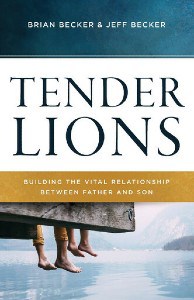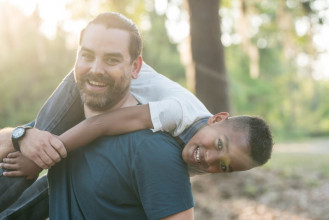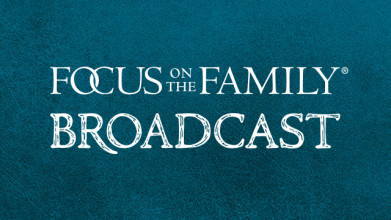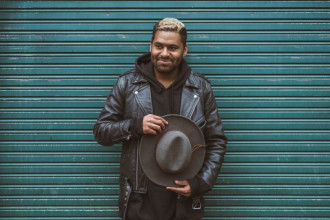John Fuller: Today on Focus on the Family, with Jim Daly, we’re gonna look at the important relationship between fathers and sons. And to help set the stage, uh, Jim, our team has identified a few quotes about dads and sons, and so, there was this one from TV journalist, Tim Russert. He said, “The older I get, the smarter my father seems to get.”
Jim Daly: (laughs). I like that. I think that applies. I have one, too. Boys do not ache for their father’s masculinity. They ache for their father’s heart.
John: Mm.
Jim: That’s good.
John: And that tender part. Hm. Here’s, uh, something from actor Robert Downey Jr. who said, “Do I want to be a hero to my son? No, I would like to be a very real human being. That’s hard enough.”
Jim: And this one is good, too. “A father’s love will always be imprinted on the heart of a son.”
John: Mm.
Jim: So, that’s a good one. That last quote really captures, uh, how I felt as a dad trying to raise my two boys. They’re in their 20s now, but man, the doubt that entered in when they were first born. I was like, “I didn’t have a good role model. I don’t know what it means to be a dad. But Lord, here we go.” (laughs). And I’m grateful that my boys have great hearts. I really appreciate that about them.
John: Mm-hmm.
Jim: And, uh, you know, if you’re raising a boy in your home, this program’s for you. I think there’s gonna be application for moms and daughters as well.
John: Mm-hmm.
Jim: But this is really to concentrate on fathers and sons and there are so many important features that a dad brings to the parenting equation.
John: Yeah. And we have a, a father/son duo here today in the studio with us. Brian Becker is a consultant and executive leadership coach. He works primarily with non-profit organizations. His son Jeff is a certified mental peak performance coach and he leads sports clinics across the US and, uh, together, they’ve written a terrific book. It’s called Tender Lions: Building the Vital Relationship Between Father and Son.
Jim: Brian, Jeff, welcome to Focus on the Family.
Brian Becker: Thanks very much.
Jim: It’s good to have you.
Brian: Absolutely.
Jeff Becker: Excited to be here.
Jim: Yeah, it’s fun. Uh, Brian, let’s start with you. In your work with non-profits, uh, you’ve observed a disturbing link between fatherlessness… Of course, we watch this data as well. Uh, between fatherlessness and many of the social ills that we see in society today. That research just confirms what I mentioned a moment ago, how important dads are. But I don’t think as a culture we get it. Throw some of those stats at us.
Brian: Well, uh, when I was, uh… Previous job before I was doing this, I read lots and lots of material about homelessness, uh, hunger, um, gang violence, trafficking, things of that nature, and I remember reading a stack of, uh, proposals one day at my desk and I literally stood up, and I don’t know if it was angel or my intuition, a- and I said out loud, “Where are the dads?” There were no dads in those pictures.
Jim: Right.
Brian: And that got me thinking about fatherlessness and the ki- implications of that. And I think Jeff probably has a better handle on the stats than I do, Jim. (laughs)
Jim: (laughs)
Jeff: And so, when we started writing the book, it was, um… We thought it was just our story, you know, just a father and son story and, um, things that we wanted to do better if we could rewrite time. But as we looked into the stats, it was very ou- eye-opening that we wanted to, to have this story really impact some lives. And so, if we look at the stats and, you know, it, it shows that roughly 20 million kids these days live without their biological father.
Jim: Physically not present.
Jeff: Physically not present.
Jim: Yeah.
Brian: Mm-hmm.
Jeff: You know, so, that’s roughly one in four kids are not with their biological dad. And if we think of the implications of that, yes, that’s magnifying, but the millions upon millions that live with their physical biological father, but the, the mental, emotional absentness, uh, of that is even more dramatic. And so, as we continue to dive deeper into that, the effects of this dysfunctional families, uh, you know, it leads to 71% of the high school dropouts, the teen pregnancies, 85% of children with behavioral disorders, 90% of the runaway and homelessness, uh, for kids, and unfortunately, it’s just the tip of the iceberg for them.
Jim: Right. Those are the fatherless stats.
Jeff: Mm-hmm.
Jim: I mean, when there’s not a dad in the home, those are the numbers.
Jeff: Yeah.
Jim: And you know, it- it’s important to say, ’cause I, I came from a single parent mom, and there are a lot of single parents, both moms and dads, who are trying to hold it together and do the right thing. So, I wanna also tip my hat particularly to the single parent moms because-
Jeff: Mm-hmm.
Jim: … that’s what I lived with, and my mom did a great job trying to cover all the bases.
Jeff: Mm-hmm.
Jim: And, uh, and, you know, thankfully, all five of us adult children now are believers in Christ, even though we came from that deficit. So, there’s hope. And I would say the, the hope is in Christ.
Jeff: Mm-hmm. Absolutely.
Jim: That’s what made the difference in my life.
Brian: Mm-hmm.
Jim: Uh, Jeff, you do work with a lot of young men and women. Sports camps are one of the things that you do. Uh, can you see that difference? I mean, sometimes I can see it when I’m working with young people. You, you know, not to pre-judge it, that’s not the point, but when there are difficulties being expressed, even socially, you’re kind of wondering, “Okay, is there a father in the home?” And often you’re right when you’re coming to the conclusion, “Probably not.”
Jeff: Yeah, that’s a great question. I think honestly why I love it so much is because I’ve seen and worked with thousands of families and I realized, you know… W- We love the phrase, it takes a village to raise a child. And I’m, I’m so fortunate and blessed that I can be a voice, a sounding board, a safe space, uh, even a mentor for some of these kids, but I, I do see it so much unfortunately, parents, dads living vicariously through their kids. Um-
Jim: (laughs). The coaching problem.
Jeff: Oh, man.
Jim: Yeah.
Jeff: Coaching from the sidelines. Uh, one of my, my good friends of mine, a sports psychologist, always, um… He gives the test or the quiz of, “All right. Here’s the challenge for you guys today. Who can be the quietest from the sidelines?”
Jim: Mm. Yeah.
Jeff: Um, because realistically, it’s… If… And we’ll probably get into the, the word of Imago Dei, but if we’re always… As a teenager and your brain’s not fully functioned, if I think my dad is… My love for my dad or my dad’s love for me is solely tied to results and trophies and, “How many points did I score?” Then my identity is totally connected to that, compared to the Imago Dei saying of, uh, “We’re made in the image and likeness of God.” And so, my dad loves me because I’m his son, not because of the trophies I had or what college I played or how many points I score.
Jim: Yeah.
Jeff: So, it’s, it’s… I see it all over the place and it’s unfortunately scary.
Jim: Oh, man, I, I remember Jean called me, I was traveling and she called from a baseball game one of my boys was playing in and she said this dad just became unglued at his son-
Jeff: Mm-hmm.
Jim: … who had struck out.
Jeff: Mm.
Jim: Like, “How could you strike out?” I mean, that is so humiliating-
Jeff: Mm-hmm. Oh, yeah.
Jim: … and, uh, damaging.
Jeff: Mm.
Jim: It’s almost the rule is if you’re gonna be at your, your son or daughter’s sports event, only speak affirmation-
Jeff: Yeah. Yeah.
Jim: … and do any kind of little correction very gently later privately, quietly.
Jeff: Yeah.
Jim: “Hey, now try this a little bit or move your-
Jeff: Yeah.
Jim: … left foot.”
Jeff: Yeah.
Jim: But man, it’s, it’s embarrassing to have that kind of dad.
Jeff: There’s, uh, there’s research that says, uh, the five words that you should say to your son or daughter after a sporting event, and only five, “I love watching you play.” That’s it.
Jim: Yeah, that’s good.
Brian: Mm.
Jeff: And then just shut up.
Jim: Yeah, right. (laughs)
Jeff: (laughs)
Brian: (laughs)
Jeff: Yeah.
Brian: Instead of rehashing the whole game on the way home.
Jeff: Yeah.
Jim: Right. “You know, that second inning, you could have done this.”
Jeff: Yeah.
Jim: “Or that s…” I had to bite my lip ’cause, uh-
Jeff: I’m sure.
Jim: … I, I can lean in that direction.
Jeff: (laughs)
Jim: Let’s go back to a minute to the absentee dad, ’cause, uh, this would be a lot of people, a lot of us.
Jeff: Mm-hmm.
Jim: You know, we’re present in the home, we’re doing the things, we’re providing, protecting, all those important things. But we get lost. We come home tired. I’m gonna go ahead and make some of the excuses, but fill in the blanks here, as to why dads aren’t engaged. I’ve always felt, you know… And for me, not having a dad was motivation to be a good dad.
Jeff: Mm-hmm.
Jim: I wanted that for my boys, and I woke up, I mean, literally every day thinking about it. “What can I do today to make sure they know I care about them and I love them?” And I guess it’s kind of shocking to me that a dad wouldn’t do that. Why wouldn’t a dad do that?
Brian: Is that me? He’s looking at me. (laughs)
Jeff: (laughs)
Jim: Jump in.
Brian: Well, I think there’s a wide variety of things that happen there. One is I, I, I believe that there’s a significant… Like Jeff said, so many dads that aren’t living with their kids. And what’s going on behind the scenes of that? Their own fear, their own anger, resentment maybe towards a spouse when they’re separated or divorced. So, one of the things that we discovered… This isn’t a direct answer to your question, but it’s a really important part. When we started looking more and more into the research, we saw one key thing. If a dad doesn’t have a good emotional connection to his boy, that’s when all those risk factors pop up. And so, how can the dad who perhaps didn’t have a mentor, was learning rights of passage, things from other junior high kids who didn’t have dads, you know… I think there’s, uh, you know, the isms. “I’m alcoholism, I’m workaholism, I’m, uh, having my own midlife crisis or whatever. And so, uh, I’m turned inward. I’m turned inward and I’m feeling bad about that. I wanna reach out and I don’t know how to reach out.” It’s gonna be really challenging for the days.
Jim: Mm. Yeah. I think I’d jump on that career of being a dad coach. I think it’s a good thing. Just drop the remote. Turn your TV off and go play catch.
Brian: Mm-hmm.
Jeff: Mm-hmm.
Jim: Just do something. Sit around the table. Play, uh, you know, spoons or hearts or something.
Jeff: Mm-hmm.
Jim: Just do a lot of physical interaction with them, too-
Brian: Yeah.
Jim: … I, I think. But it’s heartbreaking that dads are that disconnected and we justify it because we’re tired or maybe we’re just lazy.
Brian: Mm.
Jim: Part of the thing about being a man, though, is calling each other out.
Brian: Mm-hmm.
Jim: So, if you’re listening, let that be a call out to you. Do something different tonight and tomorrow night and the next night.
Brian: Mm-hmm.
Jeff: Mm-hmm.
Jim: And don’t just fall into the same routine and expect a different result. Be intentional about your parenting. That’s the best way to change.
Jeff: Yeah.
Jim: Um, both of you could address, uh, this story. There was a time in your career, and I think it was you, Brian, when you were traveling 10 to 15 days a month.
Brian: Mm-hmm.
Jim: That’s a lot. That’s about half.
Brian: Mm-hmm.
Jim: And I can relate to that. Um, what happened that day that somebody got your attention.
Brian: Yeah.
Jim: I’m sure it was Jeff (laughs), but…
Brian: So, I, I, I would come home after… I was doing corporate training and I’d come home and I’m sure my wife was going, “Here comes dad. Run to the door and, you know, jump in-
Jim: (laughs)
Brian: And that’s when they were maybe three and, uh, Jeff’s got a sister that’s two years older, so sh- Anna was five at that time.
Jim: Uh-huh.
Brian: And usually they would run to the door, “Daddy’s home,” and hug me and I, I can still remember this like it was yesterday. I came in the backdoor and Jeff was standing in the middle of the living room with his arms crossed tight. I looked at him. He had this scowl and he goes, “Daddy, I hate your job.” And I, I just felt like I got punched in the gut.
Jim: Right.
Brian: And here I had this job that I really enjoyed the work, I was good at it, it paid me well, but I could not be a good dad, I couldn’t be a good husband being out of the house half of the time. And within six months, I had a different job.
Jim: Mm.
Brian: I just felt that I, I… And I was also, at that time, I was also… We haven’t… This hasn’t come in our conversation yet (laughs), but I was also wrestling with all of the demons of my past and I hadn’t dealt with that in a healthy way. So, I knew that I was losing connection to my wife and my kids and I had to do something to get, to get a handle on that.
Jim: Yeah.
John: Yeah. And at this point of the conversation, parents, if you have young kids, uh, get them occupied elsewhere-
Brian: (laughs)
John: … or throw some earbuds in. We’re gonna talk about some mature themes, uh, now as we turn the corner.
Jim: Yeah. Brian, that was part of the story as-
Brian: Mm-hmm.
Jim: … read through the book. Um, you were kind of leading a double life. It exploded a bit.
Brian: Not kind of. (laughs)
Jim: Yeah.
Brian: I was.
Jim: Tell the audience what happened, what took place and-
Brian: Sure.
Jim: … how you laid it out there.
Brian: Sure. Well, I was one of those boys that didn’t have a good emotional connection to his dad, even though he was in the house every day. Um, I call it the perfect storm. Uh, if you guys saw that movie 20 years ago-
Jim: Mm-hmm.
Brian: … the deep sea fisherman, they went off the coast of Mai- tr… It was a movie, but it was also a true story. You know, three big storms come together. They couldn’t outrun it and it was a calamity, you know? Well, my three storms were my dad, my sister and pornography. And I had a dad on one side of the coin who was faithful to my mom, active in the church, a tither, honest man. Uh, at the table, every morning, you know, family devotions. On the other side of the coin, big temper, short fuse. I was frequently on the end of, uh, verbal tirades, and so… Not often, but sometimes physical abuse of kicks and slaps. And so, I wanted to love my dad and I was… My predominant emotion was fear.
Jim: Right.
Brian: And as I got older, it became anger.
Jim: Yeah.
Brian: And so, that was storm number one. Storm number two, let’s go all the way back, 1969. I was in junior high. My sister had just graduated from high school. We’re swimming at this lake, and she was, you know, full of life and full of faith and fun and dated the cool high school jock, you know? (laughs). And, uh, uh, we’re swimming at the lake and she was like, “Hey, my inner tube is blowing away.” So, I dove in the water and brought it back up. Came up on the dock and I looked over at her and, uh, she was, she was blue from the neck up. And those 60 seconds, she went from being full of life… She had a… We learned later she had a massive blood clot and died instantly on that dock.
Jim: Oh.
Brian: And I was, I was with her alone.
Jim: Yeah.
Brian: And for… Until I was in my mid-40s, till I got some good counseling, I had this voice that was just like, “You, you should have done something.” And I heard that, “You should have done something,” so-
Jim: Right.
Brian: … many times.
Jim: Mm.
Brian: And, um, there was… I mean, the grief and responsibility. Maybe a less- an important lesson in that is we need to be so careful as Christian men that our beliefs are based in the truth, ’cause my beliefs were based in the lies, but it still had the same powerful effect on me. Third storm, uh, pornography. That same summer, I was… I grew up on a farm. I’m going down a country road. I see something in the ditch. I pick it up. It’s hardcore pornography. I didn’t have a clue what that was. Never had a conversation with friends. Never saw it. Um, I grew up on a farm, so I knew how to reproduce (laughs), but I… A- And in that moment, uh, probably for the first time in my life, I was, like, plugged in to those endorphins that cause one to become aroused. And in the next instant, I looked around to see if somebody was watching me.
Jim: Yeah.
Brian: And s- uh, it reminds me a little bit of, like, Adam and Eve in the garden. Like, “You can eat anything, but don’t eat from that tree.” And in that moment, it says, “They were naked and they were ashamed.”
Jim: Yeah.
Brian: Well, they were naked the day before and they weren’t ashamed. And so, that sin gets that, that grasp on us. And that became… The, the pornography and, and fantasizing, masturbation, all the acting out, that became my way to sort of soothe the grief of my sister and the anger and the fear with my dad and I did not know that I was messing with a very powerful beast and it went from being interesting to obsessive, to, by the time I was a young dad, fully addicted, and I didn’t even know that was a possibility.
Jim: Yeah.
Brian: And then, I, I, uh, swore myself to secrecy and I said, “I’m gonna go to my grave with that secret.” And I think on that day, the devil went, “Ah-ha, we’ve got Brian by the throat now,” ’cause-
Jeff: Mm.
Brian: … the devil loves those sick secrets. And through the grace of God and, uh, good thinking and some counseling, I was like, “I need to get honest with my wife,” uh, even if that meant that my marriage might not survive. I believed… By the way, I’m not en- I’m not encouraging you or anyone else to, like, go home and, like, divulge all of this without some very careful thought and very careful counsel. But I did get some good counsel I was transparent with my wife, and there’s no good way to have that conversation.
Jim: No.
Brian: It’s gonna be brutal. And then Jeff and, and Anna, his sister, were in high school at that time, and they immediately noticed that the dynamics were completely different. And so, the next day I sat down with Jeff and Anna and I laid out sort of a PG version of what was going on to validate their reality.
Jim: Yeah, yeah.
John: Well, this is Focus on the Family with Jim Daly and our guests today are Brian Becker and his son Jeff Becker. They’ve written a book called Tender Lions: Building the Vital Relationship Between Father and Son. And we’ve got details about this book at focusonthefamily.com/broadcast, or call 800, the letter A and the word FAMILY.
Jim: Jeff, as I mentioned, you were a young teen, I think, when this revelation came out. Um, first of all, how did it impact you? And then how did you and your dad kind of get through that, uh, what would feel like betrayal, I would think?
Jeff: Mm-hmm. Mm-hmm. Yeah. Um, it’s a very loaded question. Um (laughs)-
Jim: (laughs). Especially since you’re sitting next to your dad.
Jeff: (laughs)
Brian: (laughs)
Jeff: Um-
Jim: But I appreciate it. I mean-
Jeff: No. Yeah.
Jim: … you guys are bold and honest, and that’s great.
Jeff: Yeah. Absolutely, absolutely. And, you know, 20 plus years ago, so I was, I think, 14. Um, it’s interesting because what I remember is I still vividly remember sitting in our family living room. I don’t remember anything really that he spoke about, but I just remember looking across the living room at my mom crying her eyes out.
Jim: Mm.
Jeff: And she’s tough, and my mom’s a former three sport athlete and she was… She’s the rock. And for her to cry like that, I was like, “There’s something really wrong.” And then started to talk about pornography and, you know, I’m 14 and I’m like, “Well, I’m not gonna say this to them, but I…” In my mind, I’m like, “Well, I go to my s- buddy’s sleepovers and, you know, the- they bring out the VHS from their dad’s closet or the magazine under the bed or whatever,” and I was like, “Well, isn’t pornography just a normal thing?”
Jim: Huh. Huh.
Jeff: Because I just, I didn’t, I didn’t know any better.
Jim: Yeah.
Jeff: I didn’t, I didn’t know the difference. Um, and it was, you know, years later till I realized the magnitude and how that can really affect in- internally, but also the relationships and stuff like that. Um, but then continuing to go into your question of just, um, how did we continue to mend our relationship? Uh, it took years, honestly. Um, you know, some people think, “Well, it’s just gonna be a quick conversation and we’re gonna go thr- throw the baseball outside or the football outside and we’ll be okay.” And, I mean, it took a long time. I mean, day after day, my dad had to be vulnerable and show up and be present and show that he was really working on himself, the marriage, the relationship, our family. I mean, I remember… I, I mean, as we mentioned in the basketball world and I’d come home from practices and games and the weight room and he’d be sleeping on the couch, and not just for days, and not just for weeks, but for months. Um, but little by little, conversation after conversation, hard, vulnerable conversations, uh, he kept showing up and-
Jim: Yeah.
Jeff: … I think that was the biggest thing is, you know, it’s kind of the Humpty-Dumpty, he fell of the wall and he, he… And we had to, brick by brick, month after month, kind of relayer that wall of trust for us to be kind of where we are today now.
Jim: Well, and that’s what it, it comes down to is that breach of trust-
Jeff: Mm.
Jim: .. and then, you know, especially between you and your wife, first and foremost.
Jeff: Mm-hmm.
Jim: And I, you know, I think on the one hand, I certainly applaud the courage that you laid it out there and got help and healing and your wife was, um, you know, courageous enough to stick in with you and-
Brian: Mm-hmm.
Jim: … for the sake of the kids, I’m sure, was a big part of it.
Brian: Mm-hmm.
Jim: But when you look back now all these years, um, right thing to do?
Brian: Oh, for me, it was the only thing to do, and it was, uh, my faith that kept being at the center of that. And as much as the… There were difficulties with my dad, my dad was the most honest man I ever met. He was faithful to my mom for 59 years before she passed away. And I think that was one of the reasons why, you know, God put a conscience in us that kept nudging me. (laughs)
Jim: Yeah.
Brian: “You’re in a bad place. You’ve gotta do something about this.”
Jim: Yeah.
Brian: And, um, Jeff mentioned it takes a village. Um, I… One of the main reasons I’m married today isn’t ’cause I’m such a great guy. It’s ’cause my wife had good Christian girlfriends.
Jim: Yeah.
Brian: And early, early on, some of her non-faith friends were like, “Oh, he did that. He… Well, he’s an addict. Oh, kick him out. Divorce him.” And it was her other friends, who she’s still good friends with today (laughs), who were like, “Wait a second, Kim. You, you can’t make that type of a decision when you’re standing in the fire. You have to get out of the fire and then get perspective.” And they, they talked to her, they listened to her-
Jim: Yeah.
Brian: … they cried with her, they prayed with her, and over time, months, uh, she forgave me.
Jim: Yeah. And, you know-
Brian: And that was powerful.
Jim: … this isn’t the only part of the book. It’s really not about-
Brian: Mm-hmm.
Jim: … uh, porn addiction and recovery. It’s an aspect of your journey, and that’s how you treat it in Tender Lions.
Brian: Mm-hmm.
Jim: Let’s move through that now. Uh, how did you come up with the title and how are lions considered tender? I don’t really… I’ve been to Africa a few times. Haven’t seen that tender lion yet.
Brian: (laughs)
Jeff: Well, I, I agree. Uh, the, the… When we started writing the book and my dad was like, “What do you think about the title, Tender Lions?” I’m like, “That’s dumb.” (laughs)
Brian: (laughs)
Jim: (laughs). Wow, you guys do have a good relationship.
Brian: Oh, yeah. (laughs)
Jeff: Um, but the more I thought about it, and I was kind of growing into my manhood and, um, me maturing, I was like, “I get it.” Like, you know, as men, we think of lions, we think of-
Jim: Yeah.
Jeff: … strong and decisive and leader and the big mane and the powerful. And… But as men, we need to be tender.
Jim: Yeah.
Jeff: We need to be vulnerable. We need to be in touch with our emotions and, uh, we need to be understanding and vulnerable and, and present. And that’s so much of what we think is it’s such a good cool combination of when to be one and when to be the other.
Jim: Yeah.
Jeff: And how do you show up, you know, tender in your heart and relationships, but also this lion in competition and what we need to do?
Jim: Yeah.
Brian: A- And the lion is, the lion is only the, the lion we think of when it’s threatened or when it’s hunting for its family.
Jim: Mm.
Brian: The rest of the time, it’s, like, nudging their cubs and with the pride and relaxing and staying healthy. Most of its life is in that laid back. But when I need to be other, I need to be the other. But it’s also, how can we be wise enough and sensitive enough to know when to be one and when to be quiet and (laughs) to, to lay back? So-
Jim: No, it’s so true. I had a great conversation with my son, Trent, the other day and he’s, you know, turned into quite a big guy. He lifts weights. He’s 6’7-
Brian: Mm.
Jim: … and, uh, formidable. And we were talking about, you know, the, the attitudes and the idea-
Brian: Mm.
Jim: … of the peacemakers and the meek.
Brian: Mm-hmm.
Jim: And he, he gave a very interesting observation to me. He just said, “Dad, it’s not that I can’t be violent. It’s I choose peace.”
Brian: Mm.
Jeff: Mm.
Jim: And I thought, wow, that’s an interesting way to define gentleness in manhood.
Jeff: Mm.
Jim: I’ve got the ability to do what I would need to do-
Jeff: Mm-hmm.
Jim: … but I choose not to because of my relationship with Christ.
Brian: Powerful.
Jeff: Mm-hmm.
Jim: That’s powerful. That means you’re ready to go.
Jeff: Yeah.
Brian: Mm-hmm.
Jim: But you choose through the Spirit not to.
Brian: Mm-hmm.
Jeff: Mm-hmm.
Jim: Um, that’s pretty good-
Brian: Yeah.
Jim: … I think.
Brian: Je- Jesus has many great examples-
Jim: Oh.
Brian: … in the New Testament.
Jim: He’s the example.
Brian: Yeah. And the, the one lion example was when he went into the temple and made the whip out of the rope and chased out th- people out of the market and, uh… But then he was with the adulterous woman and-
Jim: Jeff-
Brian: … finds a way to reach her without making her feel horrible-
Jim: Mm-hmm.
Brian: … and she goes back and transforms her neighborhood because of how he dealt with her and, um, he chooses a way to go and rest after every time he does some major event to pray and to meditate and takes his team with him and-
Jim: Yeah.
Brian: … really powerful example.
Jim: Yeah. I think it’s a good way to look at it. Don’t, don’t accept that for being lazy-
Brian: Mm-hmm.
Jim: … physically or any other thing.
Brian: Mm-hmm.
Jim: Always be prepared to be ready.
Brian: Mm-hmm.
Jim: But choose peace, if you can.
Brian: Yeah, yeah.
Jim: And I think that’s really a good metaphor. Jeff, you’re a new dad. I think, uh, your little one’s, like, one.
Jeff: He is today.
Jim: To- Today.
Jeff: Today.
Brian: Yeah.
Jim: So, that’s awesome. When you look at your experience and you look at your dad and, and your relationship, looking down the road, what do you wanna see for your relationship with your own son?
Jeff: That’s a great question. And he actually just brought this up to me just for the first time a few weeks ago. Um, there’s two things I think of. I, I think of our dynamic and our relationship and obviously the, the thousands of families and father/son relationships I’ve seen through athletics and, um, the good and the bad and the ugly. I think there- there’s two things that I think of is show up. You gotta be present, and ni- I don’t mean just physically present.
Jim: I like it, yeah.
Jeff: You, you gotta be emotionally and, and mentally there and, and present. And we were talking off air about the distractions of our phone and social media and all the media stuff. Um, role model. Live it. And I think that’s the hardest thing is, is so many times… I, I love The Cord. I say this a lot i- is parenting is caught more than it’s taught, you know? Especially you get into the teenage years, you know, you… We can say a lot of great things. We can teach everything and… But do you actually live it? And, and that’s, I think… As I work specifically mostly with teenagers is parent, you know… Teenagers are not gonna listen to their dad. I di- I didn’t listen much to him, um-
Jim: (laughs)
Jeff: … during my, during my teenagers years.
Jim: Mm-hmm.
Jeff: But it’s caught more than it’s taught. And so, if you can show it and live it and be there every single day, uh, with your presence, I think that’s, that’s most important, so.
Jim: I think it’s true.
Brian: We, we spoke to a group of almost 400 men in Grand Island on Palm Sunday and, uh, one of the first times that he and I, since COVID, were able to stand side by side and speak. It was fantastic. And one of the questions we asked the men in the group is, “Give us three words about your dad,” and they’re just shouting words out, “Integrity. Present. Abusive. Absent.” Uh, you know, it went from one end of the spectrum to the other. And then at one point, I said, “So, Jeff, what are your words about me?” And, uh, they were, they were nice. It was focused and centered. And, and I said, “What would they have been 20 years ago?”
Jeff: I think I said, um, disconnected-
Brian: Liar.
Jeff: … liar, um, fraud. Um-
Brian: Mm-hmm. Mm-hmm. And so, I said, “It is never too late to take the first step in the right direction.”
Jim: Yeah.
Brian: And then we ended that presentation by saying, “Let’s say your kids are in this room 20 years from now. What do you want their three words to be about you?”
Jim: Yeah.
Jeff: Mm-hmm.
Jim: Well, that’s a perfect place to end. I mean, really.
Brian: (laughs)
Jim: That, uh… What a challenge for-
Brian: Yeah.
Jeff: Mm-hmm.
Jim: … all fathers listening, viewing. Um, that’s a great way and, and great perspective-
Jeff: Mm-hmm.
Jim: … on which to wrap this up. And what do you want your children to say today, if you’re living it, and 20 years from now, 10 years from now if you’re not?
Jeff: Mm-hmm.
Jim: This has been so good. Thank you for being with us.
Jeff: Thank you.
Brian: Thank you.
Jim: This is great insight.
Brian: Thank you.
Jim: I hope everybody gets a feel for the book and the material. I mean, we can’t cover everything and these two have done a wonderful job of capturing the right stuff to put in Tender Lions: Building the Vital Relationship Between Father and Son. I’m always on the lookout for great, great resources and this theme. And so, this is one of those I’d highly recommend. Get it from us directly. And if you can, make a gift, uh, monthly or a one-time gift and we’ll send it as our way of saying thank you for being part of the ministry.
John: Mm. Yeah, we really appreciate, uh, anything you can contribute right now. Our number is 800, the letter A and the word FAMILY. 800-232-6459. And we’ve got further details at focusonthefamily.com/broadcast. And earlier, we mentioned, uh, some pretty gritty things. Uh, life sometimes gets very difficult. If you don’t have somebody to turn to, please know, uh, our donors have generously made it possible for us to have a caring team of Christian counselors, and we can schedule a consult for you to kind of talk through where you’re at and find some steps toward healing and, uh, getting on the right path. Our number, uh, again, for those free counseling services, is 800, the letter A and the word FAMILY. On behalf of Jim Daly and the entire team, thanks for joining us today for Focus on the Family. I’m John Fuller, inviting you back next time as we once again help you and your family thrive in Christ.




















